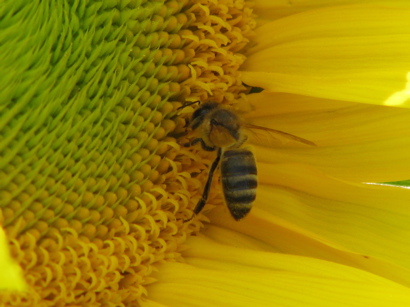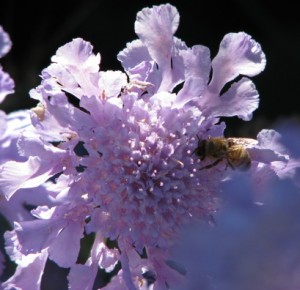About That Bee Book

As you know, I’ve had bees on my mind for weeks. I keep talking about Fruitless Fall: The Collapse of the Honey Bee and the Coming Agricultural Crisis, the book about bee colony collapse written by my former grad-school classmate, Rowan Jacobsen.
How much have you read about bee colony collapse?
I knew the honeybee’s numbers were declining. I remember hearing the wacky cell phone theory several years back, and that was laughed out of the news, and since then I’ve just heard ominous mutterings now and then about the bees disappearing and nobody knows why.
But I didn’t know the half of it.
I didn’t know, for example, that nowadays U.S. beekeepers earn most of their income—far more than they earn selling honey—trucking their hives around the country to pollinate crops. Somehow this gobsmacks me. We are dependent on migrant worker bees for the produce we grow in this country.
I definitely didn’t know that in the winter of 2006/2007, huge numbers of these hives began to die, and no one is sure exactly why. There are theories, which is a lot of what Rowan’s book is about: an in-depth and thoughtful exploration of what could possibly be causing the collapse of our bee colonies.
As I said above, when I heard about “the disappearance of the honeybee” I thought it meant declining numbers. Pesticides, I assumed (and indeed that seems to be a major factor). What I didn’t get was that bees literally disappeared. The hives died because the forager bees flew out and didn’t fly back home. There are diseases and pests that kill bees, and you find dead bees in and around the hive. (That’s happening too, in horrifying numbers.) But in other cases, the bees just up and disappeared. One possible explanation, Rowan learned, is a kind of disorientation and memory loss known to be a symptom of neurological damage caused by certain pesticides. It’s possible the bees are suffering from something like bee Alzheimer’s due to exposure to toxins meant to kill other insects. They fly off to work and can’t find their way back home. And in other hives, there are bees carrying every bee disease, fungus, and pest known to afflict the honeybee world—all at once. It’s as if their immune systems have been decimated (possible cause: the catastrophic wave of varroa mite infestation that arrived in this country a few years back and is a terrible scourge in many parts of the world right now), leaving them susceptible to other illnesses.
And it isn’t just the honeybees: we know a lot about the decline in their numbers because they are domesticated bees, owned by devoted beekeepers who know exactly how many hives they have lost to varroa and bee colony collapse. No one has good numbers on all the other pollinating insects out there, except it seems clear honeybees aren’t the only pollinators in decline. Did you know vanilla beans are hand-pollinated by humans? The insect pollinator has been wiped out.
 Obviously Fruitless Fall made a big impact on me. Shook me up; Jane too. The funny thing is, at the very same time that it was scaring the pants off me (a world short on pollinators is a scary, scary concept), it was filling me with wonder and delight. I know that sounds impossible. It’s the way Rowan looks so closely, with humor, warmth, and affection, at this ordinary (extraordinary!) creature, the honeybee. It reminded me of the John Stilgoe book I kept raving about last year, Outside Lies Magic. Remember that one? What Stilgoe did for me with power lines and telephone poles, Rowan Jacobsen did for me with bees and honey and even figs. The early chapters describing life in a beehive and the life cycle of the bee were so engaging that I read them aloud to 8-year-old Beanie, who was captivated. Jane (almost 14) has read the book at least three times now. She begged me to order Rowan’s book on chocolate—along with our very own copy of Fruitless Fall. Which is a good thing, because I find myself wanting to thrust the book at everyone I talk to. It’s that kind of book.
Obviously Fruitless Fall made a big impact on me. Shook me up; Jane too. The funny thing is, at the very same time that it was scaring the pants off me (a world short on pollinators is a scary, scary concept), it was filling me with wonder and delight. I know that sounds impossible. It’s the way Rowan looks so closely, with humor, warmth, and affection, at this ordinary (extraordinary!) creature, the honeybee. It reminded me of the John Stilgoe book I kept raving about last year, Outside Lies Magic. Remember that one? What Stilgoe did for me with power lines and telephone poles, Rowan Jacobsen did for me with bees and honey and even figs. The early chapters describing life in a beehive and the life cycle of the bee were so engaging that I read them aloud to 8-year-old Beanie, who was captivated. Jane (almost 14) has read the book at least three times now. She begged me to order Rowan’s book on chocolate—along with our very own copy of Fruitless Fall. Which is a good thing, because I find myself wanting to thrust the book at everyone I talk to. It’s that kind of book.

